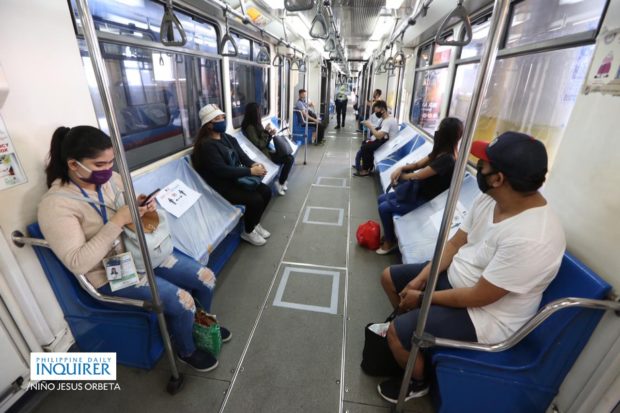
Scenes during the resumption of the MRT-3 operations at the North Avenue Station in Quezon City on the first day of the general community quarantine in Metro Manila on Monday, June 1, 2020. Niño Jesus Orbeta/Philippine Daily Inquirer (FILE)
MANILA, Philippines — President Rodrigo Duterte has “preliminarily” approved the recommendation of the government’s pandemic task force to extend until July 15 the current general community quarantine (GCQ) in the National Capital Region and nearby provinces, or the so-called NCR Plus.
The Inter-Agency Task Force for the Management of Emerging Infectious Diseases (IATF) placed Metro Manila, Rizal and Bulacan under GCQ with some restrictions and Laguna and Cavite under GCQ with heightened restrictions.
Placed under regular GCQ status for the whole of July were Baguio City, Ifugao, Santiago City, Isabela, Nueva Vizcaya, Quirino, Batangas, Quezon, Guimaras, Aklan, Bacolod City, Negros Occidental, Antique, Capiz, Zamboanga Sibugay, Zamboanga City, Iligan City, General Santos City, Sultan Kudarat, Sarangani, North Cotabato, South Cotabato, Cotabato City, Agusan del Norte, Agusan del Sur and Surigao del Norte .
The task force also put 21 cities and provinces under Modified Enhanced Community Quarantine, the second strictest category, until July 15, due to rising COVID-19 cases. These were Cagayan, Apayao, Bataan, Lucena City, Puerto Princesa City, Naga City, Iloilo City, Iloilo province, Negros Oriental, Zamboanga del Sur, Zamboanga del Norte, Cagayan de Oro City, Davao City, Davao Oriental, Davao Occidental, Davao de Oro, Davao del Sur, Davao del Norte, Butuan City, Dinagat Islands and Surigao del Sur.
The rest of the country would be under Modified GCQ.
“These are the preliminarily approved community quarantine classifications for the month of July because these are subject to appeal until tonight by LGUs,” presidential spokesperson Harry Roque said in a press briefing, adding that the IATF would meet on Wednesday afternoon to approve the final community quarantine classifications and issue its resolution on the matter.
Increased capacities
Roque said the IATF also wanted venue capacities slightly increase in some establishments for Metro Manila, Rizal and Bulacan.
Indoor sports facilities such as gyms, indoor tourist attractions such as museums, and indoor dining could have up to 40 percent capacity, with no more need to secure the government’s safety seal.
Outdoor tourist attractions could reopen with up to 50 percent capacity subject to strict adherence to minimum public health standards.
Venues for meetings, exhibitions and conferences could reopen with up to 40-percent capacity, but when used for other social events, the allowable capacity would be only 10 percent.
Venues for religious activities such as wakes, baptisms and weddings could have up to 30-percent venue capacity, which the LGU could increase to 50 percent.
Shorter quarantine
Starting July 1, the latest rules of the IATF also said that fully vaccinated travelers coming from “green” or low-risk countries would need to quarantine in a facility for only 7 days instead of 10 days upon arrival in the Philippines.
This is the same quarantine requirement for inbound international travelers who were earlier fully vaccinated in the Philippines.
Those vaccinated abroad must have stayed exclusively in countries identified as having low-risk for COVID-19 for the past 14 days immediately preceding their arrival. The Department of Health would issue a list of these “green” countries.
All fully vaccinated travelers would also need to undergo a reverse transcription-polymerase chain reaction test on the 5th day of quarantine and complete their 7-day stay in the facility even if they tested negative. If found positive, they should follow isolation protocols.
They would also have to monitor themselves for any COVID-19 symptoms for the next 7 days.
Travel ban
The DOH also said that said there was no need to restrict inbound travelers from Indonesia.
However, the Philippines extended until July 15 the ban on travelers from India, Pakistan, Nepal, Bangladesh, Sri Lanka, Oman and the United Arab Emirates.
“Our recommendation will be not to add additional countries to be banned, but let us try to strengthen more our border controls,” said Health Undersecretary Rosario Vergeire.
Former adviser and health advocate Dr. Tony Leachon called for a travel ban on Indonesia, specifically due to its proximity to the Philippines.
In a television interview Tuesday, Vergeire said the Philippines could not ban travelers from all of the countries affected by the Delta variant. “We can see right now that there are 92 countries with the Delta variant and we cannot isolate the Philippines from all of these countries,” Vergeire said.
Vergeire said there were many factors considered when restricting travel from a specific country, for instance the number of overseas Filipinos who might return to the Philippines.